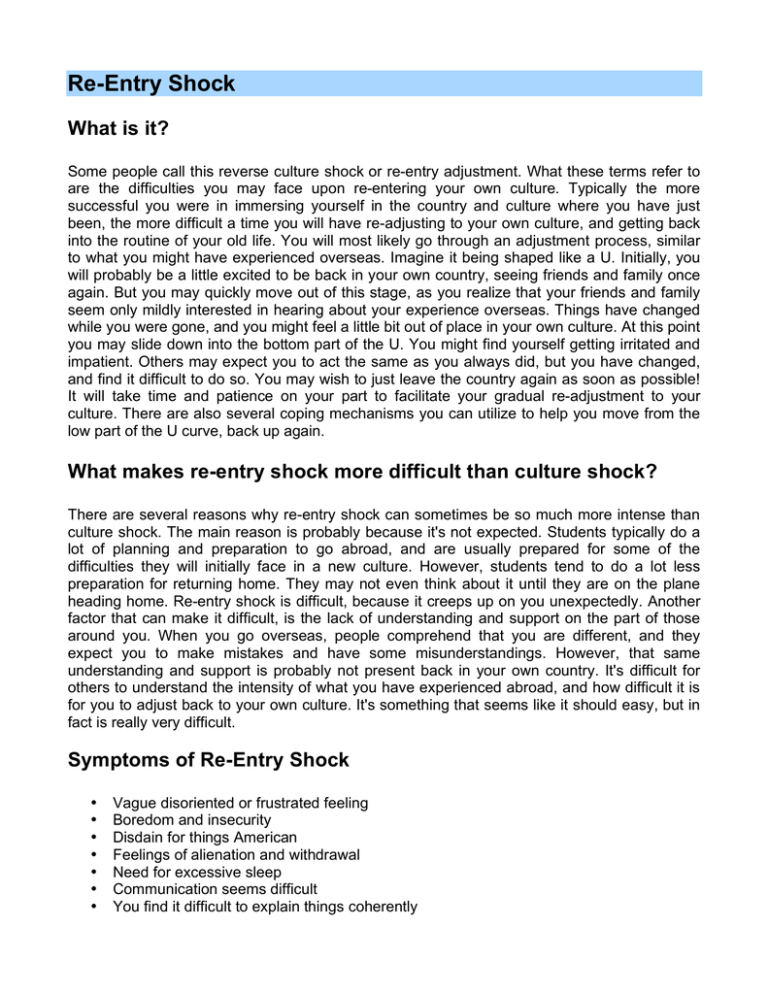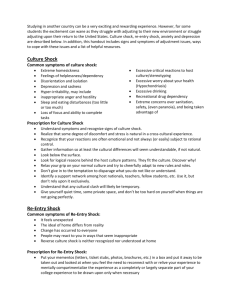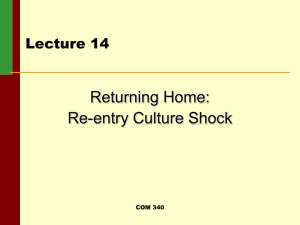Re-Entry Shock
advertisement

Re-Entry Shock What is it? Some people call this reverse culture shock or re-entry adjustment. What these terms refer to are the difficulties you may face upon re-entering your own culture. Typically the more successful you were in immersing yourself in the country and culture where you have just been, the more difficult a time you will have re-adjusting to your own culture, and getting back into the routine of your old life. You will most likely go through an adjustment process, similar to what you might have experienced overseas. Imagine it being shaped like a U. Initially, you will probably be a little excited to be back in your own country, seeing friends and family once again. But you may quickly move out of this stage, as you realize that your friends and family seem only mildly interested in hearing about your experience overseas. Things have changed while you were gone, and you might feel a little bit out of place in your own culture. At this point you may slide down into the bottom part of the U. You might find yourself getting irritated and impatient. Others may expect you to act the same as you always did, but you have changed, and find it difficult to do so. You may wish to just leave the country again as soon as possible! It will take time and patience on your part to facilitate your gradual re-adjustment to your culture. There are also several coping mechanisms you can utilize to help you move from the low part of the U curve, back up again. What makes re-entry shock more difficult than culture shock? There are several reasons why re-entry shock can sometimes be so much more intense than culture shock. The main reason is probably because it's not expected. Students typically do a lot of planning and preparation to go abroad, and are usually prepared for some of the difficulties they will initially face in a new culture. However, students tend to do a lot less preparation for returning home. They may not even think about it until they are on the plane heading home. Re-entry shock is difficult, because it creeps up on you unexpectedly. Another factor that can make it difficult, is the lack of understanding and support on the part of those around you. When you go overseas, people comprehend that you are different, and they expect you to make mistakes and have some misunderstandings. However, that same understanding and support is probably not present back in your own country. It's difficult for others to understand the intensity of what you have experienced abroad, and how difficult it is for you to adjust back to your own culture. It's something that seems like it should easy, but in fact is really very difficult. Symptoms of Re-Entry Shock • • • • • • • Vague disoriented or frustrated feeling Boredom and insecurity Disdain for things American Feelings of alienation and withdrawal Need for excessive sleep Communication seems difficult You find it difficult to explain things coherently • • • • Others don't seem to understand you You feel resistant to family and friends It's hard to relate to others, or find common ground with them All you can think about is going back Environmental Changes that Affect Re-adjustment • • • • • • • Noise level is different (you now hear all of the background noise that you might have tuned out if you were learning the language in your host country. Suddenly you hear everything and it feels like sensory bombardment) Weather (humidity and temperature) Hours of sunlight Urban / rural settings Racial makeup of population Smells and sounds Pace of life and activity around you Coping Strategies • • • • • • • • • Get together with others who have been to the same area as you Maintain a sense of patience and humor, similar to when you initially went overseas Keep in touch with the friends and contacts you met while you were away Seek out international news so you don't feel so abruptly cut off from your experience Look for ways to use the new skills and knowledge you gained while abroad, i.e. giving a slide show or talk at your local library, Rotary club, etc. Write about your experience, and share it with others, or submit it for publication Maintain a healthy diet, and exercise Visit elementary/middle/high schools to speak about your experience Get involved with international students on campus




